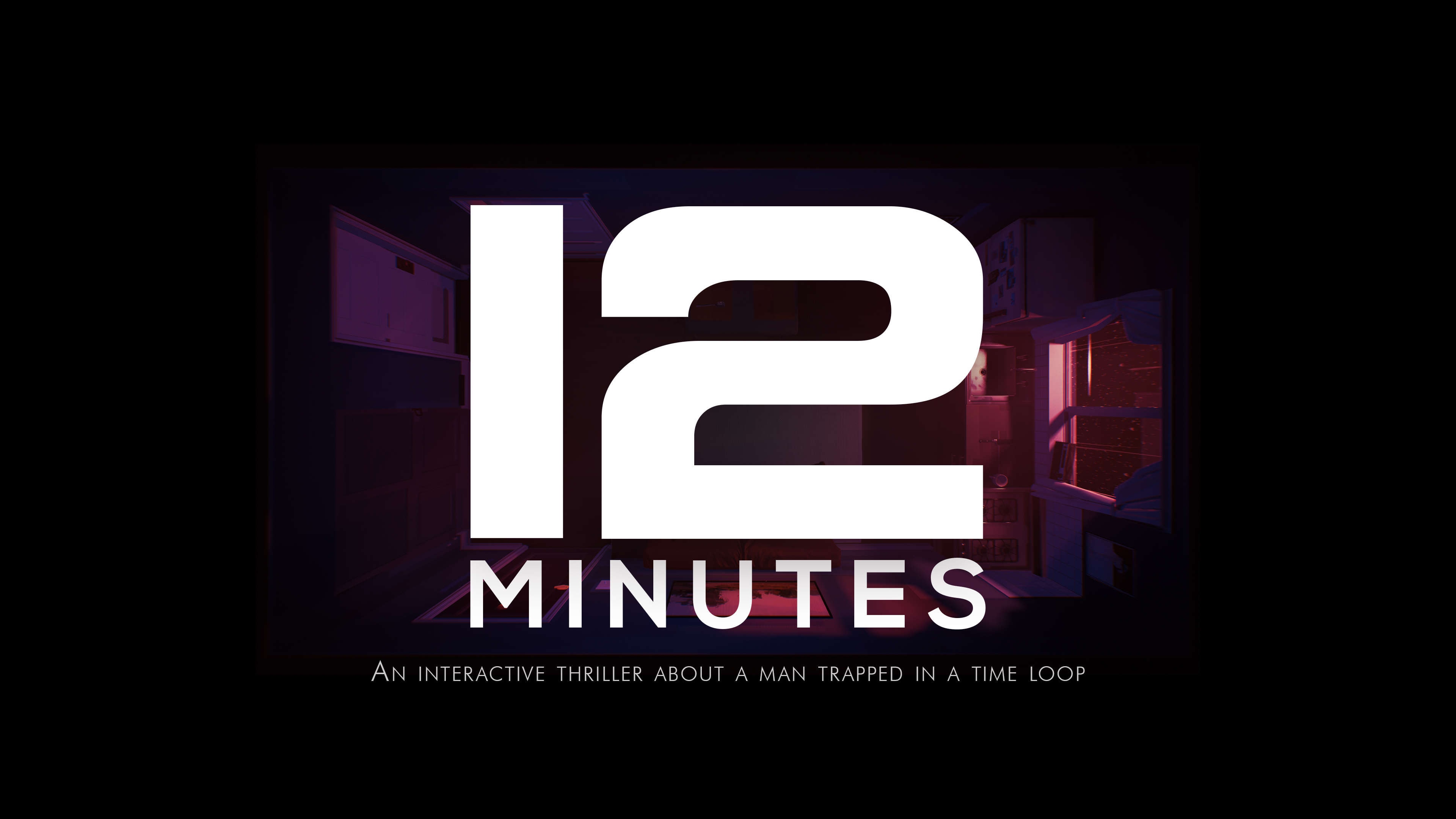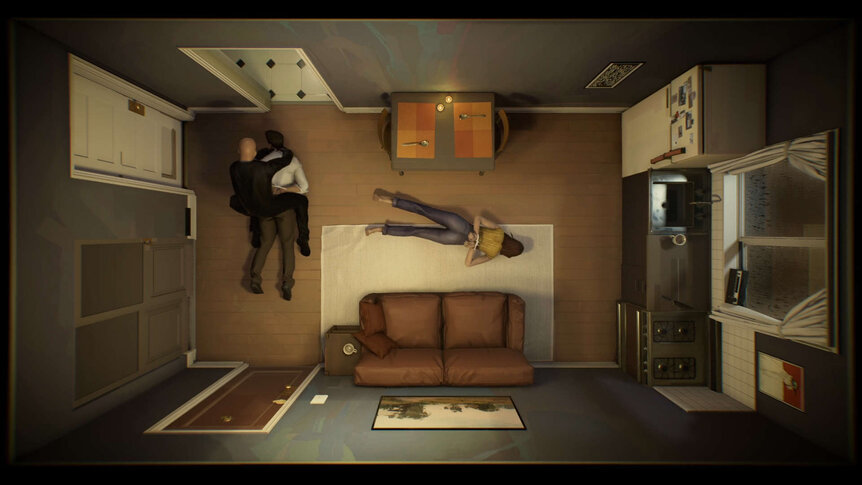Create a free profile to get unlimited access to exclusive videos, sweepstakes, and more!
'12 Minutes' is like a playable 'Memento' starring James McAvoy and Daisy Ridley

Eight years ago, artist, developer, and director Luis Antonio left the world of corporate gaming companies to go indie and explore the idea of a game all about accumulated knowledge. Knowing that all video games are essentially a loop of decisions that play out based on the player's course of action, Antonio was driven to explore making a more intimate video game that uses time loops, like Memento or Groundhog Day, as the backdrop concept for an interesting interactive experience. The result is 12 Minutes, a top-down navigation game from Annapurna Interactive that uses your decisions — from the micro to the macro — as the game’s engine.
Last month, Antonio gave SYFY WIRE an interactive walk-through of the most recent version of 12 Minutes. With its noir aesthetic and claustrophobic set contained within one modest apartment, 12 Minutes felt akin to playing the really evolved cousin of Zork mixed with an adult version of a Choose Your Own Adventure book. While the graphics are relatively basic compared to high-end titles these days — much like an elevated Sims — the sheer scope of the freedoms afforded to the player within the set feels positively endless.
"The whole game, all of it, happens inside the apartment," Antonio explains to SYFY WIRE. "There are two main characters: the husband played by James McAvoy and the wife by Daisy Ridley, and then the intruder played by Willem Dafoe. You play as the man who comes home from work. His wife has prepared a special evening. As the evening starts, a stranger knocks on the door and accuses the wife of murder. You try to stop him, but you get knocked out and go back to the start of the evening. Then, you have to use the knowledge of what is about to happen to change the outcome and break the loop."
With most of today’s games, there are any number of maps, visual hints, or non-playable characters baked into the fabric of the gameplay to help the player move through their overall goals. With 12 Minutes, there’s nothing to guide you, which was Antonio’s choice to make the game more elemental.
"This game is really designed for people that don't play games," he says. "As long as you can click on your mouse, you can go in and explore what I hope will be a rich experience."
In the early development, Antonio says he was focused more on task-based elements, like a player learning key codes for locked doors to ascend levels. "But it felt very superficial," he admits. "And then I realized what's really interesting about this [game] is how you use that knowledge, which is not just about doors or key codes. It was about people, about relationships, about how you interpret others and their actions. And then what if the game is actually not telling you what to do?"
He continues, "And that's the main motivation of this project, this accumulated knowledge and how the player interprets this accumulated knowledge. The game never tells you what to do. It's all about how you decide to react. The character is going to learn alongside you, so everything you experience, he is going to experience, and then everything resets. But he accumulates all the knowledge of the things he went through."
With only three main characters in the game’s entire narrative, Antonio says 12 Minutes now feels more like a character piece along the lines of a theater play. "But when I started, I never expected to have voice acting. I thought it would just be dialogue speeches as the game was always top-down, and we never see the character’s faces."
However, as the game progressed, it became clear to Antonio and his team that everything hinged on the player believing in these people and caring about them so they act on what's happening with urgency and investment. They turned to Annapurna Interactive, which were able to use its filmmaking arm to access some top-tier talent to elevate the concept. McAvoy, Ridley, and Dafoe were pitched on the game and the unique collaborative process of helping flesh out the characters via table reads and voice recordings since the script was mostly non-linear.
"Because you don't see the faces, a lot of the performance has to come from the way they speak," Antonio explains. "Like if James' character is stressed out, it has to come through in the shaking of his voice. Or if the wife is smiling, there's no facial expression, so you have to feel the smile through the way she opens her mouth. There was workshopping to figure out how to really convey this, and then we wrote extensively the story of all the characters for when we were in the recording sessions."
The actors were asked to all speak in an American accent, a first for Ridley, which ends up being important to the overall narrative. And, Antonio says the actors also got very invested in the interior logic and emotional lives of their characters, which only added to the final game. "Sometimes we're doing scenes and they would question the motivations because I thought more about the gameplay elements," the director says sheepishly. "But James would be like, 'Why would I be doing this? It's true for me to be doing this because I want the player to know this, but the character doesn't think this way.' So, we would deconstruct, realize the motivations and then bring them back in and it would naturally enrich the character. They would become more realistic and you'd care more about them."
Estimated to be about six to eight hours of gameplay, Antonio says the individualistic nature of the game means not everyone will experience it in the same way. "There's some beats that you will go through no matter what order you play," he explains. "But what I've seen from people that play, there's this refraction of what they went through, and how they interpret and judge the characters. Like what is trusting someone, and how you see relationships, and how you see things at face value? It allows you to ask those questions, but it's open for your interpretation, and allows you a bit of exploration and discussion with other people who went through different branches in the experience."
Does that mean there are multiple endings to experience? Antonio offers this: "The question of an ending only applies to linear formats, where you play a movie and get to the end. I realized that I have the tools to do more than just getting from a start to an ending. Once I knew I could do this, it was asking what would be an ending to a character that’s stuck in a time loop? And the answer to that question is that after about six to eight hours, you will reach something of a satisfactory ending, or a conclusion to the experience. But the wrapping up of it is different from what a movie or a book would be like when you get to the last page."
12 Minutes will be released by Annapurna Interactive on platforms including Microsoft Windows, Xbox One, and Xbox Series X/S in 2021.



























